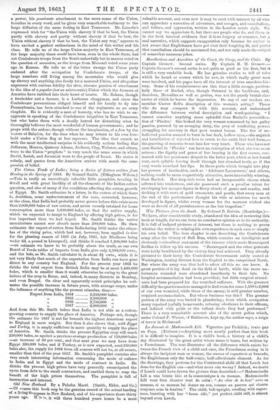La Awn& de Mademoiselle Lili. Vignettes par Frohlich; texte par
un Papa. (Triibner.)—Anything more nearly perfect than this book it is difficult to imagine. It is a child's book, a history of a child's day illustrated by the great artist whose name it bears, but written by a Frenchman. The text illustrates all the difference which exists be- tween the French view of a child and ours, the Frenchman seeing in it always the incipient man or woman, the nuance of coquetterie or bravado, the Englishman only the half-comic, half-affectionate element. As for the drawings, they perform for the Continental child all that Leech has done for the English one—and what more can we say ? Indeed, we doubt if Leech could hate drawn the picture thus described :—" Mademoiselle Lili a une bonne idiae at is communique a sa maman. Mademoiselle Lili vent bien chanter tout de suite : "Au clair de la lens" avec sa maman, si sa maman lui donne tua son, comma au pauvre qui chant° tonjours sous la fenetre." The child, bolt upright, swelling with eager- ness, bursting with her "bonne idie," yet perfect child still, is almost beyond even Leech.






























 Previous page
Previous page